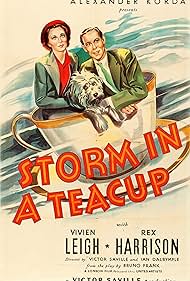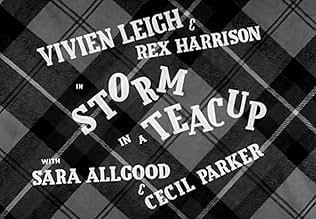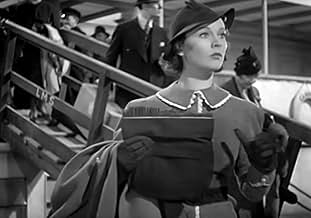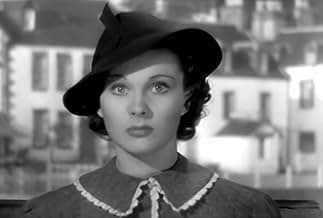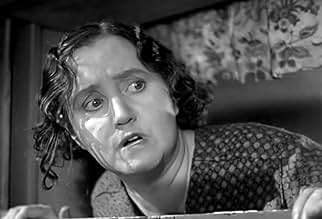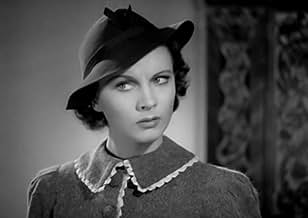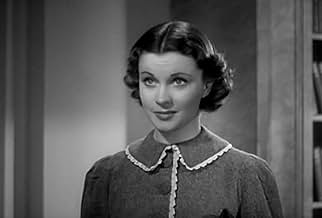IMDb RATING
6.5/10
1.2K
YOUR RATING
A local politician in Scotland tries to break the reporter who wrote a negative story about him, and who is also in love with his daughter.A local politician in Scotland tries to break the reporter who wrote a negative story about him, and who is also in love with his daughter.A local politician in Scotland tries to break the reporter who wrote a negative story about him, and who is also in love with his daughter.
Edgar K. Bruce
- McKellar
- (as Edgar Bruce)
Quinton McPherson
- Baillie Callender
- (as Quinton Macpherson)
Featured reviews
I agree with the previous reviewer that this British film is an attempt by them to produce a Frank Capra like populist comedy. Certainly Cecil Parker as the town provost could easily have fit into a Capra film, a Mr. Potter from Scotland. Rex Harrison could easily be James Stewart, standing up for good.
Cecil Parker is the provost (Mayor?) of a small Scottish town called Baikie way in the rural north. Parker's an efficient manager who's come to the attention of party bigwigs who want to run him in a bi-election for an open seat in Parliament.
Parker is also a fatuous, arrogant oaf with the public relations sense of an ostrich. While being interviewed by reporter Rex Harrison, Sara Allgood who's a poor widow who can't afford the money for a dog license has her dog taken by Parker's police to be put to death as a stray. As she's begging, he throws her into the street.
Harrison who was going to do a puff piece as we would now call it, is outraged enough to write what occurred.
Complicating things is the fact that Harrison's fallen big time for Parker's daughter, Vivien Leigh. This was an early film for both and the megastardom that was destined for both is apparent.
Of course being the oaf he is with his ego out of joint, Parker keeps escalating this storm in a teacup until it's a nationwide issue. But the ending couldn't have been better done by Frank Capra himself.
Lots of laughs in this one and check out the scene where the dogs invade Parker's house. Could have been done as a short subject in and of itself.
Cecil Parker is the provost (Mayor?) of a small Scottish town called Baikie way in the rural north. Parker's an efficient manager who's come to the attention of party bigwigs who want to run him in a bi-election for an open seat in Parliament.
Parker is also a fatuous, arrogant oaf with the public relations sense of an ostrich. While being interviewed by reporter Rex Harrison, Sara Allgood who's a poor widow who can't afford the money for a dog license has her dog taken by Parker's police to be put to death as a stray. As she's begging, he throws her into the street.
Harrison who was going to do a puff piece as we would now call it, is outraged enough to write what occurred.
Complicating things is the fact that Harrison's fallen big time for Parker's daughter, Vivien Leigh. This was an early film for both and the megastardom that was destined for both is apparent.
Of course being the oaf he is with his ego out of joint, Parker keeps escalating this storm in a teacup until it's a nationwide issue. But the ending couldn't have been better done by Frank Capra himself.
Lots of laughs in this one and check out the scene where the dogs invade Parker's house. Could have been done as a short subject in and of itself.
Widowed Mrs. Hegarty (Sara Allgood), ice cream peddler residing in a fictive West Scottish coast village, Baikie, has as sole companion her dog Patsy, but after she neglects to pay an annual canine licensing fee, the Provost (Mayor) of Baikie, William Gow (Cecil Parker) commands that the animal be dispatched, thereby inciting the titular tempest, for which a young English journalist is largely responsible. He is Frank Burdon (Rex Harrison), recently arrived in Baikie to begin employment with its newspaper. "The Advertiser", and it is Frank's willfulness that brings trouble upon himself as well as for others. In spite of romantic mutual attraction between Frank and Gow's daughter Victoria (Vivien Leigh), the dauntless reporter is well pleased to find a strong human interest slant within Mrs. Hegarty's plight and composes a story that immediately is spread throughout Scotland, therewith effectively putting an end to Gow's political ambitions, as he was preparing to stand for a parliamentary post, an aspiration that has apparently gone a-glimmering due to the Patsy affair, with the Provost moved to exact redress from Burdon by suing him for slander, an action that summons the probability of a final break between Frank and Vickie Gow. The film is constructed upon a play, "Storm Over Patsy", written in 1930 by German expatriate to the United States Bruno Frank, who settled in Hollywood as a screenwriter. It was rephrased for its exhibition upon the American stage by Glaswegian James Bridie and mounted with a good deal of success during 1936 and 1937 upon Broadway, the production generally featuring vocative Allgood in addition to Leo G. Carroll as Willie Gow. The provincial complexion of Baikie is more clearly rendered upon the screen than the boards, and fortunately Alexander Korda supplies adequate funding to furnish what he intends as a "small" film with significant numbers of extras along with a gaily embellished mise-en-scène. A contemporaneous review of the picture by producer/director/critic Basil Wright, published in The Spectator, expanded the amiable film's popularity, and it has retained a following because of its colourful scenes and characters, but a viewer will make note as well of superb costuming and, as must be expected, a superior performance by Parker who handily annexes the acting laurels here.
When a young reporter, Frank Burdon (Rex Harrison), is given an assignment to interview a rather nasty and self-important local politician, it turns out to be very unpleasant. Although Provost Gow (Cecil Parker)* wants to run for parliament, he does a horrible job of impressing the reporter. This is because during the interview, Gow and Burden are interrupted by a local woman (Sara Allgood) who is begging the Provost to help her. Instead of helping, Provost Gow is completely unsympathetic and cruel--and vows to have the old lady's dog put to sleep!! Burdon is horrified and angry--how dare this local political boss mistreat his constituents like this! So he does what any honest reporter would do--he publishes the truth! This is a serious problem, though, as the paper was backing the Provost AND the Provost wasn't about to back down. Another problem is that Burdon soon falls in love with the Provost's daughter (Vivian Leigh)--and this relationship is surely doomed! This is a delightful film--sort of like a droll and British version of a screwball comedy. The dialog is GREAT and Harrison is at his best. It also helped that Cecil Parker was WONDERFUL as the buffoon politician. All in all, a great little film.
*Speaking of Parker, he looked, sounded and acted almost exactly like David Horton (David Waldhorn). The likeness of the two characters is amazing.
*Speaking of Parker, he looked, sounded and acted almost exactly like David Horton (David Waldhorn). The likeness of the two characters is amazing.
Hidden from me, anyhow - I'd never heard of it until browsing through my local library's video collection. Imagine an Ealing comedy as directed by Frank Capra. All of the acting is first-rate (and Vivien Leigh, pre-"Gone with the Wind", was about as beautiful as any woman could be), and the sets are unusually lavish for what must have been a medium-budget film in its time. The characters are strong yet sufficiently complex to lift the story above the simplistic comic melodrama it might have been - I can't imagine many American films of the time (or of this time) that would allow the "villain" of the piece enough courage to face down and walk through a mob that has just publicly humiliated him and is ready to attack him. The comedy is wonderfully handled, especially during the scene in which a pack of dogs runs rampant through the villain's stately home, and during the climactic courtroom scene. (The film's funniest line makes sense only in the context of the film: Ursula Jeans' anguished "Harold, he called me a woman!") "Storm in a Teacup" is a genuine delight.
Flaws include too many cutaways for reaction, and a bit of obviousness in the plot, but those flaws are vastly out-numbered by the pleasures and joys of the total production.
As with other reviewers, I had never even heard of this movie and most of the players, so it was a surprise and delight to discover it.
I am always happy to see a motion picture present the evils of tyrannical government, even local government.
And the bullying of the chief government official, over what is to him such a minor, even trivial, matter shows just exactly what all of us, even 82 years after the release of this movie, and even thousands of miles from its setting, need to be aware of from even our neighborhood politicians and bureaucrats.
At the same time, the particular bully shows a lot of personal courage and is to be admired for it, and for his moral self-confidence.
However, as philosopher Sidney Hook warned us, and often unsuccessfully warned us, confidence in one's moral code is not good enough when that code is wrong; and courage to continue to believe in a wrong code is a dangerous courage.
As light-hearted as this production ultimately is, it is still both a lot of fun and a nice under-stated message. I highly recommend it, and there is a print available via Kanopy (for subscribers) and at YouTube.
As with other reviewers, I had never even heard of this movie and most of the players, so it was a surprise and delight to discover it.
I am always happy to see a motion picture present the evils of tyrannical government, even local government.
And the bullying of the chief government official, over what is to him such a minor, even trivial, matter shows just exactly what all of us, even 82 years after the release of this movie, and even thousands of miles from its setting, need to be aware of from even our neighborhood politicians and bureaucrats.
At the same time, the particular bully shows a lot of personal courage and is to be admired for it, and for his moral self-confidence.
However, as philosopher Sidney Hook warned us, and often unsuccessfully warned us, confidence in one's moral code is not good enough when that code is wrong; and courage to continue to believe in a wrong code is a dangerous courage.
As light-hearted as this production ultimately is, it is still both a lot of fun and a nice under-stated message. I highly recommend it, and there is a print available via Kanopy (for subscribers) and at YouTube.
Storyline
Did you know
- TriviaYoung Scots guy with a Glaswegian accent, who is Sir Rex Harrison's caddy, is a young Scottish actor called Jack Short (he didn't get a credit).
- GoofsDuring a break in the trial, when Victoria told her father that she is not married, Provost Gow exclaims that she committed perjury, and this is apparently his motive to drop the case. However, Victoria did not commit perjury. Although she made the marriage claim within the courtroom, she was not in the witness box and was not under oath, having not been sworn in by the court clerk.
- Quotes
Frank Burdon: The people of these islands are the most long-suffering in the world - they'll put up anything: they'll pull in their belts if they think it's their duty, they'll even go to the ends of the earth to be blown to bits if necessary. But there's two things they won't put up with - bullying and cruelty.
- Crazy creditsIn keeping with the Scottish setting, the opening credits are shown on various Scottish plaids.
- ConnectionsFeatured in Vivien Leigh: Scarlett and Beyond (1990)
- How long is Storm in a Teacup?Powered by Alexa
Details
- Runtime1 hour 27 minutes
- Color
- Aspect ratio
- 1.37 : 1
Contribute to this page
Suggest an edit or add missing content

